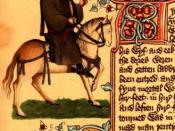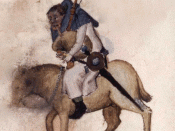The Tale of the Miller
In Chaucer's Canterbury tales, the Miller's tale is said to be arguably the most humorous of the number. It is easy to see why this is said as one reads through the prologue and the tale. Though vulgar at it's best it is also said to give one a good idea of how the lower classes in Chaucer's time seemed to relate between one another.
Following the completion of the Knight's tale the host challenges the Monk to tell a tale to repay it. The Miller, who is so drunk he can barely stay mounted upon his horse, starts shouting and swearing that he has a tale to match the Knight's. The host, noting his rudeness, attempts to persuade him to allow a better man proceed but the Miller will not hear of it and carries on with his tale anyway. Chaucer then take a brief pause in the story to allow for the host's warning that the tale that follows is short on both holiness and morality, but there is a prize at stake so he must continue; with that being said he allows the tale to begin.
John, an old, jealous carpenter, ignored Cato's warning that one should "marry someone like himself: people wed according to their condition, for youth and age are ofter at odds (Chaucer 152-153; The Miller's Tale lines 42-44)." Alison, whom he married, was a girl much younger and more beautiful than himself. As will happen, in cases such as this, the young Alison had many admirers who were most smitten with her.
It happened one day that the old carpenter was away, and Nicholas, the pleasant astrology clerk, did grab Alison "where he shouldn't and said 'Unless I have my will of you, sweetheart, I'm sure to die...


